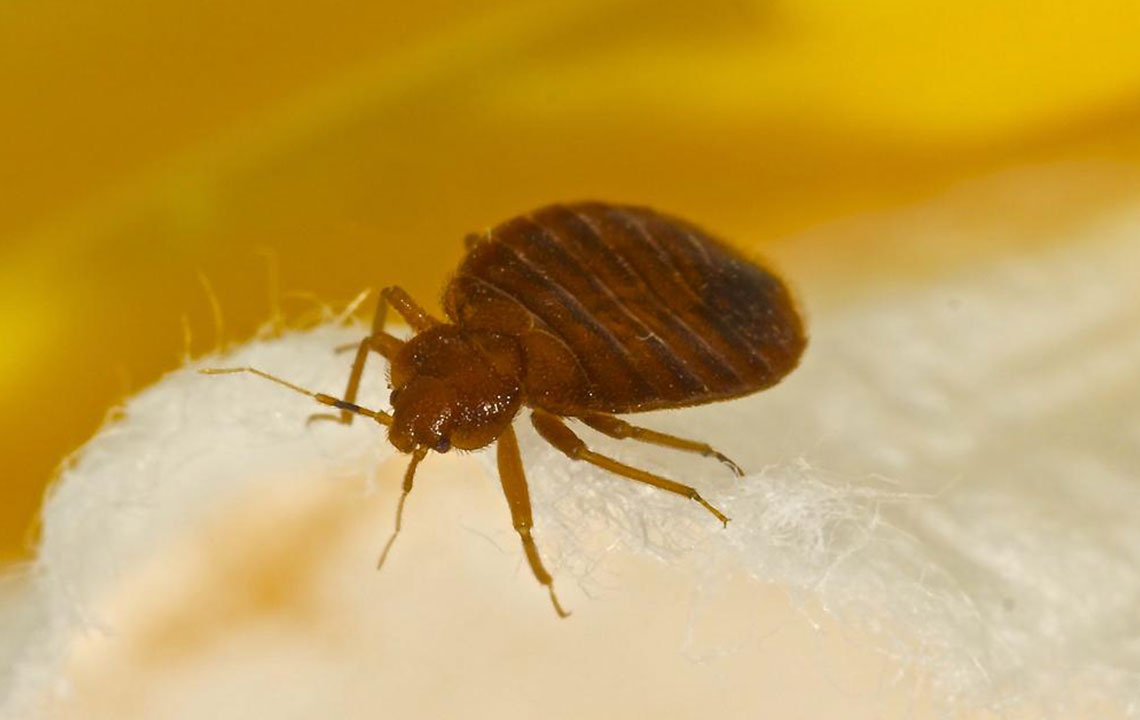The Most Common Signs Of Bed Bugs

Bed bugs are nocturnal insects that are flat and shaped like an almond. They feed on human blood, and are generally found in household furniture like bed, couch, upholstered chairs and other such items.
If the infestation is severe, signs of bed bugs can be found in cupboards, wall-mounted furniture, table lamps, screw holes, light fittings and other places around the house.
Bed bugs generally come out at night, to feed on their host. Therefore, it becomes very difficult to spot them in the day. Their small size helps them to hide in plain sight, without raising any alarm.
Adult bed bugs are as small as 1 to 7mm in size. The eggs and nymphs are even smaller.
Their eggs and nymphs are so tiny, that they can be mistaken for dirt particles. This makes it easy for them to hide along the seam lines of mattresses, and at other places without being caught.
The eggs of these stealthy bed bugs are covered in a shiny and sticky substance, that helps them stick to the surface of the mattress. This makes it hard to remove them, even after taking appropriate cleaning measures.
Bed bugs are also difficult to spot because of their feeding pattern. Each bed bug goes through six stages before reaching adulthood. For every stage, they need to feed at least once, before reaching the next stage. This means that they don’t need to feed daily. The bite marks, are not consistent and you can not guess if it’s because of bed bug infestation.
Bite marks appear days after the bedbugs bite a human being, because they inject a small amount of anesthesia into the body before biting. This gives the bed bugs enough time to infest your house completely, before you realize that there is a pattern to the bite marks you have.
Here is a comprehensive list of some telltale signs of bed bugs in your house. A single sign from the following list might not guarantee that it is a bed bug infestation. Look for a combination of more than one of these signs, to confirm that bed bugs are the cause of your misery.
Bed Bug Shells
At every stage of growth, bed bugs need to feed at least once and molt. Molting is a process of shedding the exoskeleton or outer shell, as the bed bugs outgrow them. The cast or shell is translucent, and if you look closely, you can find them in their hiding areas.
Fecal Stains
When bed bugs bite or feed on human blood, they often let go of the feces from the previous blood feed they had, on your mattress and bedding. This is one of the most common signs of bed bugs.
These excretions are very small in size, almost that of a pinhead, but can be distinctly seen because of their dark color.
The fecal matter is made up of digested blood and therefore is blackish brown in color. The fecal matter looks like little black marker dots, that seep through the linen.
These excretions can be found in the hiding places of the bed bugs like—small holes, crevices, and cracks behind the bed and small spaces in the furniture.
Blood Stains
Similar to the fecal stains, this sign if bed bug can sometimes be found when the bed bugs come out to feed, they get crushed between the sheets and under humans.
They leave blood stains often, when they die. If you find unusual little smears of blood on your bed sheets and pajamas, chances are that your bedding might be infested with bed bugs.
Little Colored Spots
When you are changing your bed sheets and making your bed, look for small dark spots in a group. These spots could be dead bed bugs, their fecal matter or nymphs.
The fecal matter is black or brown in color, the nymphs are beige in color while the eggs are shiny white in color. Mostly a group of spots can be seen along the stitching lines in the mattress.
Bed Bug Bites
Although the most common signs of bed bugs, Bed bug bites are not one of the primary indications of bed bug infestation, but if they occur in combination with any of the above-stated signs, a bed bug infestation is more likely. The bite marks look no different from mosquito bites, or bites from any other insect. This makes it hard to discern if the red welts are actually from bed bugs, or from any other insect.
Bite marks appear two or three days after the actual biting takes place. They are red spots with a dark red center. These bites generally affect any one part of the body, and appear in a line with multiple bite marks.
The bite marks cause burning and itching sensation as soon as they appear. If scratched, the bite marks can cause secondary infections by bacteria and other microorganisms.



